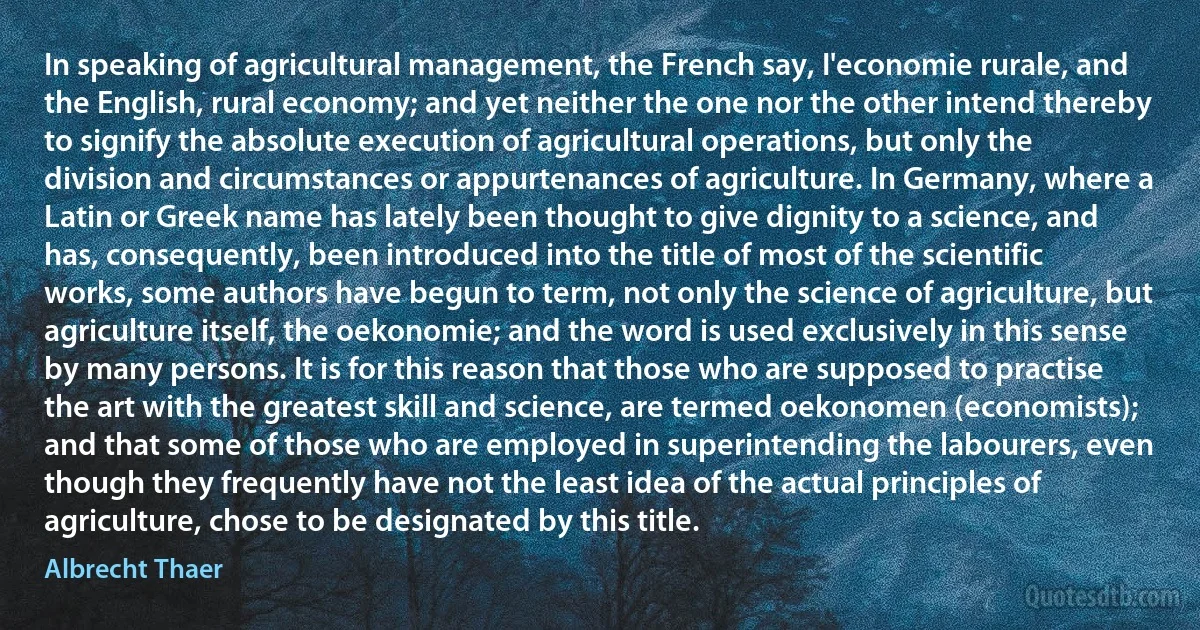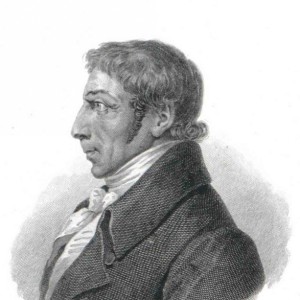Albrecht Thaer quotes
The religious instruction I received of the Lutheran pastor Bode, preparatory to my confirmation, produced no effect upon my mind in favour of the truth of our divine religion, having studied all the works written against it with so much energy. I often insinuated to pastor Bode my doubts on religious matters, but either he did not or would not understand me; I was wavering between deism and atheism, so much so, that had it not been for the love towards my revered father, and the persuasions of Ferry, I should have avoided being present at the imposing and sacred ceremony of confirmation, which produced such an effect upon my young mind, that I prayed sincerely to God to give me faith, and had I not continued to read with Ferry and one Belzing so many blasphemous works, I should have returned to my former religious principles much sooner, as I did at a later period of my life.

Albrecht Thaer
In both the kinds of land we have been considering [i. e., classes of very fertile soil, rich in humus], we have supposed the humus to be mild, or exempt from acidity. J Sour or acid humus totally destroys the fertility of a soil; sometimes, however, the soil contains so very small a portion of acidity that its fertility is very slightly diminished, and only with regard to some few plants. Barley crops become more and more scanty in proportion as the acidity is increased; but oats do not appear to be at all affected by it. Rye grown on such land is peculiarly liable to rust, and is easily laid or lodged. The grains of all the oereals become larger, but contain less farina. Grass which grows on these spots is, both in species and taste, less agreeable, and less suitable for cattle, than any other, although it yields a very considerable produce in hay. In fact, in exact proportion with the increase of acidity, is the decrease of the value of the soil...

Albrecht Thaer
Among others, Doctor Caritens died during a momentary absence of my father, who recommended while stepping into his travelling chariot, to bleed the Doctor a second time. I did as he bid me, although convinced that emetics and opening medicine would cure the patient without fail; the Doctor died, and you may easily imagine the state of my feelings. I had just begun to publish a work on practical physic, but had no heart to finish it after this sad catastrophe. I betook myself again to philosophy. I wished daily to return to Gottingen, if I could do so with honour. I passed three years under such painful circumstances, when my friend Leisewitz invited me to go with him to Berlin, for which purpose his brother-in-law in Brunswick would advance me money to defray my expenses. Without much consideration, I accepted the invitation, and my portmanteau was soon ready.

Albrecht Thaer
Agriculture is the art of deriving from the earth the most valuable organic productions. He who exercises this art, seeks to obtain profit by causing to grow, and by using, its animal and vegetable productions. The more considerable the gain derived, therefore, the better is the object accomplished. The most perfect agriculture is, evidently, that which produces, by the application of labour, the largest and the most permanent profit in comparison with the means employed. Systematic agriculture ought, then, to teach us all the circumstances by means of which we may derive the most considerable profit by the practice of the art.

Albrecht Thaer
The art of agriculture is the realization of some ideal object. lie who practises it has received from others, without considering the reasons on which it is founded, the idea or rule by which he proceeds. The skilful practice of an art consists, therefore, in the adoption of new ideas, in the study of new rules, and in judging the fitness of their being carried into practice.

Albrecht Thaer
My mother, as much as I can remember from my early boyhood, and from what I heard of her after her death, was of a most lively temper, and possessed of a good and noble heart, but a little inclined to sensibility; her greatest pleasure was to see everyone happy about her. She loved me dearly and spoilt me. I adored her. Alas, I lost her when only a little boy, and never shall I efface from my memory the day of her death and funeral.

Albrecht Thaer
In my eighteenth year, my father sent me to the University of Gottingen. The first winter I did not leave the Anatomical School, and although I gave myself up to the most intense study, I willingly entered into all the gaities and amusements so much sought by German students, but avoided carefully debaucheries of any kind; they gave me the cognomen, Half Benommist, owing to my puerile look and feeble and weak voice. Unzer and Ebeling, two students in physic, took me under their powerful protection, and extricated me out of many scrapes.

Albrecht Thaer
My father was a cool-tempered and unaffected man. Everyone who came in contact with him knew his straightforward way of acting, his scrupulous honesty; but few, very few, of his friends knew his noble and manly heart. Indifferent to praise and fame, as well as calumny, he was ever anxious to do good in silence; and it can be said of him, without fear of contradiction, that during his whole life he could never reproach himself with having been guilty of a bad or mean action.

Albrecht Thaer
The science of agriculture rests on experience; and nothing else should be required or expected from it but that which appertains to a practical science. The first principles arise from the perceptions of the senses; but if experience wholly and entirely flowed from these perceptions, the development would not be less the offspring of science and the work of the understanding.

Albrecht Thaer
Now, my dear Philippine, a few words more. I am not rich; but my affairs are not in a deranged or desperate state, and were I to die to-day, and my property sold, it would fetch 5,000 dollars at least, so that I possess 2,000 dollars more than my father gave me. I have but 400 dollars salary; my practice is good, and becomes daily more lucrative; the income I derive from it now is more than sufficient to keep a good and respectable house; my prospects are flattering; but I can and must not name them at present; I will not bring them into account.

Albrecht Thaer


 Born: May 14, 1752
Born: May 14, 1752
